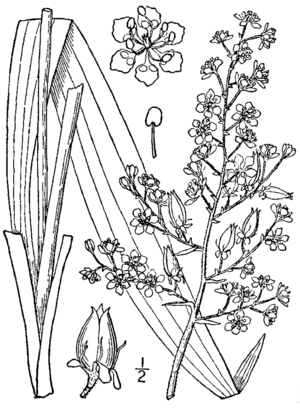Slender bunchflower facts for kids
Quick facts for kids Slender bunchflower |
|
|---|---|
 |
|
| Veratrum hybridum | |
| Conservation status | |
| Scientific classification | |
| Genus: |
Veratrum
|
| Species: |
hybridum
|
| Synonyms | |
|
|
Veratrum hybridum is a type of flowering plant. People often call it the slender bunchflower or crisped bunchflower. It belongs to the Melanthiaceae plant family.
You might see this plant called by other names, like Melanthium latifolium. However, Veratrum hybridum is now the official name. This is because the "hybridum" part of its name was given to it nine years earlier.
Contents
Where the Slender Bunchflower Lives
This plant grows naturally in the eastern parts of the United States. It is especially common in the Appalachian Mountains.
What the Slender Bunchflower Looks Like
The slender bunchflower is a perennial herb. This means it lives for more than two years. It grows from a bulb and has underground stems called rhizomes. These rhizomes help the plant spread.
Its main stem can grow quite tall, up to 1.6 meters (about 5 feet) high. The leaves are shaped like a spear (lance-shaped). They can be very long, up to 55 centimeters (about 22 inches) and 7.2 centimeters (about 3 inches) wide.
Flowers and Seeds
The plant's flowers grow in a cluster called an inflorescence. This cluster is a main stem with smaller branches of flowers, like a raceme. Each flower has small, woolly green or purplish leaves called bracts. It also has six white or yellowish petal-like parts called tepals.
After flowering, the plant produces a fruit. This fruit is a capsule, which is like a small seed pod. It can be up to 2 centimeters (about 0.8 inches) long. Inside, it holds seeds that have small wings, helping them spread.
How the Slender Bunchflower Reproduces
Even though the slender bunchflower makes flowers and seeds, it doesn't always flower every year. Most of the time, it reproduces in a different way. It uses vegetative reproduction. This means new plants can grow directly from its underground rhizomes. It's like a clone of the parent plant!
Where It Grows
You can find the slender bunchflower in deciduous forests. These are forests where trees lose their leaves in the fall. It likes places that are moist and shady, such as deep, narrow valleys called gorges.
Sometimes, it grows near another plant called the Appalachian bunchflower. However, the slender bunchflower usually prefers lower elevations (less high up) than its cousin.
In places like the Shenandoah National Forest, it has been seen growing with oak and hickory trees. Other plants that often grow nearby include:
- White snakeroot (Ageratina altissima)
- flypoison (Amianthium muscitoxicum)
- wild yam (Dioscorea villosa)
- white wood aster (Eurybia divaricata)
- bigleaf aster (E. macrophylla)
- Allegheny hawkweed (Hieracium paniculatum)
- widowsfrill (Silene stellata)
- Atlantic goldenrod (Solidago arguta)
- mountain decumbent goldenrod (S. caesia var. curtisii)
- hairy goldenrod (S. hispida)
- meadow zizia (Zizia aptera)
- Eastern hayscented fern (Dennstaedtia punctilobula)


